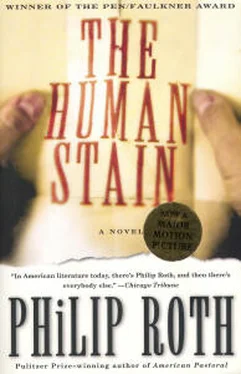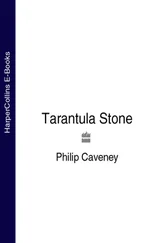“Did you know before today,” I asked her, “why it was that Coleman had resigned from the college?”
“I did not. I thought he'd reached a retirement age.”
“He never told you.”
“No.”
“So you couldn't know what Keble was talking about.”
“Not entirely.”
So I told her about the spooks business, told her that whole story then, and when I was finished she shook her head and said, straight out, “I don't believe I've ever heard of anything more foolish being perpetrated by an institution of higher learning. It sounds to me more like a hotbed of ignorance. To persecute a college professor, whoever he is, whatever color he might be, to insult him, to dishonor him, to rob him of his authority and his dignity and his prestige for something as stupid and trivial as that. I am my father's daughter, Mr. Zuckerman, the daughter of a father who was a stickler for words, and with every passing day, the words that I hear spoken strike me as less and less of a description of what things really are. Sounds from what you've told me that anything is possible in a college today. Sounds like the people there forgot what it is to teach. Sounds like what they do is something closer to buffoonery. Every time has its reactionary authorities, and here at Athena they are apparently riding high. One has to be so terribly frightened of every word one uses? What ever happened to the First Amendment of the Constitution of the United States of America? In my childhood, as in yours, it was recommended that each student who graduated from high school in New Jersey get at graduation two things: a diploma and a copy of the Constitution. Do you recall that? You had to take a year of American history and a semester of economics — as, of course, you have to no longer: ‘have to’ is just gone out of the curriculum. At graduation it was traditional in many of our schools in those days for the principal to hand you your diploma and somebody else to give you a copy of the Constitution of the United States. So few people today have a reasonably clear understanding of the Constitution of the United States. But here in America, as far as I can see, it's just getting more foolish by the hour. All these colleges starting these remedial programs to teach kids what they should have learned in the ninth grade. In East Orange High they stopped long ago reading the old classics. They haven't even heard of Moby-Dick, much less read it. Youngsters were coming to me the year I retired, telling me that for Black History Month they would only read a biography of a black by a black. What difference, I would ask them, if it's a black author or it's a white author? I'm impatient with Black History Month altogether. I liken having a Black History Month in February and concentrating study on that to milk that's just about to go sour. You can still drink it, but it just doesn't taste right. If you're going to study and find out about Matthew Henson, then it seems to me that you do Matthew Henson when you do other explorers.”
“I don't know who Matthew Henson is,” I said to Ernestine, wondering if Coleman had known, if he had wanted to know, if not wanting to know was one of the reasons he had made his decision.
“Mr. Zuckerman...” she said, gently enough, but to shame me nonetheless.
“Mr. Zuckerman was not exposed to Black History Month as a youngster,” I said.
“Who discovered the North Pole?” she asked me.
I suddenly liked her enormously, and the more so the more pedantically teacherish she became. Though for different reasons, I was beginning to like her as much as I had liked her brother. And I saw now that if you'd put them side by side, it wouldn't have been at all difficult to tell what Coleman was. Everyone knows ... Oh, stupid, stupid, stupid Delphine Roux. One's truth is known to no one, and frequently — as in Delphine's very own case — to oneself least of all. “I forget whether it was Peary or Cook,” I said. “I forget which one got to the North Pole first.”
“Well, Henson got there before him. When it was reported in the New York Times, he was given full credit. But now when they write the history, all you hear about is Peary. It would have been the same sort of thing if Sir Edmund Hillary were said to have gotten to the top of Mount Everest and you didn't hear a word about Tenzing Norkay. My point,” said Ernestine, in her element now, all professional correctitude and instruction — and, unlike Coleman, everything her father ever wanted her to be—“my point is, if you have a course on health and whatever, then you do Dr. Charles Drew. You've heard of him?”
“No.”
“Shame on you, Mr. Zuckerman. I'll tell you in a minute. But you do Dr. Drew when you have health. You don't put him in February. You understand what I mean?”
“Yes.”
“You learn about them when you study explorers and health people and all the other people. But everything there now is black this and black that. I let it wash over me the best I could, but it wasn't easy. Years ago, East Orange High was excellent. Kids coming out of East Orange High, especially out of the honors program, would have their choice of colleges. Oh, don't get me started on this subject. What happened to Coleman with that word ‘spooks’ is all a part of the same enormous failure. In my parents' day and well into yours and mine, it used to be the person who fell short. Now it's the discipline. Reading the classics is too difficult, therefore it's the classics that are to blame. Today the student asserts his incapacity as a privilege. I can't learn it, so there is something wrong with it. And there is something especially wrong with the bad teacher who wants to teach it. There are no more criteria, Mr. Zuckerman, only opinions. I often wrestle with this question of what everything used to be. What education used to be. What East Orange High used to be. What East Orange used to be. Urban renewal destroyed East Orange, there's no doubt in my mind. They — the city fathers — talked about all the great things that were going to happen because of this urban renewal. It scared the merchants to death and the merchants left, and the more the merchants left, the less business there was. Then 280 and the parkway cut our little town in quarters. The parkway eliminated Jones Street — the center of our colored community the parkway eliminated altogether. Then 280. A devastating intrusion. What that did to that community! Because the highway had to come through, the nice houses along Oraton Parkway, Elmwood Avenue, Maple Avenue, the state just bought them up and they disappeared overnight. I used to be able to do all my Christmas shopping on Main Street. Well, Main Street and Central Avenue. Central Avenue was called the Fifth Avenue of the Oranges then. You know what we've got today? We've got a ShopRite. And we've got a Dunkin' Donuts. And there was a Domino's Pizza, but they closed. Now they've got another food place. And there's a cleaners. But you can't compare quality. It's not the same. In all honesty, I drive up the hill to West Orange to shop. But I didn't then. There was no reason to. Every night when we went out to walk the dog, I'd go with my husband, unless the weather was real bad — walk to Central Avenue, which is two blocks, then down Central Avenue for four blocks, cross over, then window-shop back, and home. There was a B. Altman. A Russek's. There was a Black, Starr, and Gorham. There was a Bachrach, the photographer. A very nice men's store, Minks, that was Jewish, that was over on Main Street. Two theaters. There was the Hollywood Theater on Central Avenue. There was the Palace Theater on Main Street. All of life was there in little East Orange...”
All of life was there in East Orange. And when? Before. Before urban renewal. Before the classics were abandoned. Before they stopped giving out the Constitution to high school graduates. Before there were remedial classes in the colleges teaching kids what they should have learned in ninth grade. Before Black History Month. Before they built the parkway and brought in 280. Before they persecuted a college professor for saying “spooks” to his class. Before she drove up the hill to West Orange to shop. Before everything changed, including Coleman Silk. That's when it all was different — before. And, she lamented, it will never be the same again, not in East Orange or anywhere else in America.
Читать дальше












